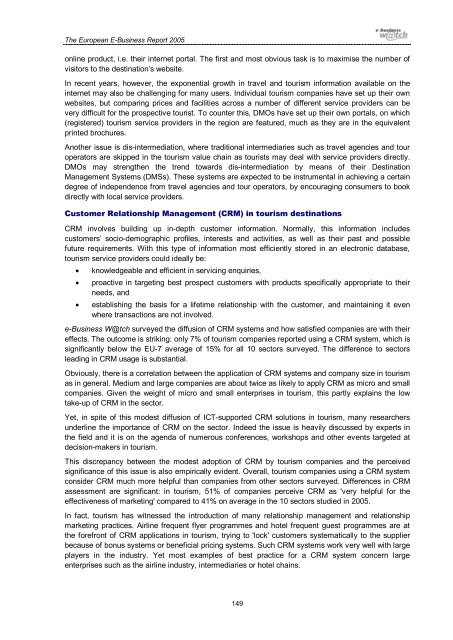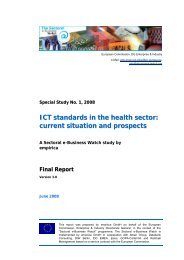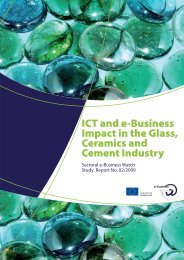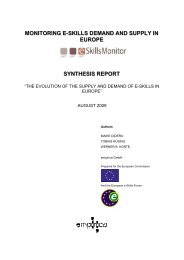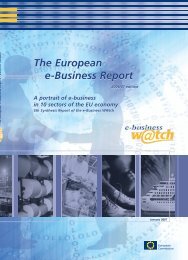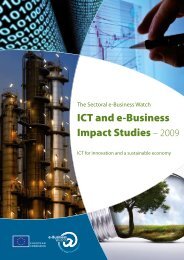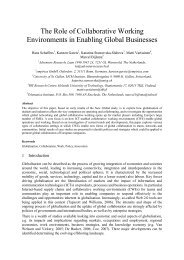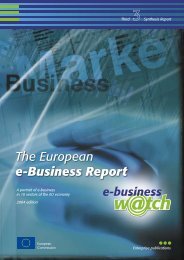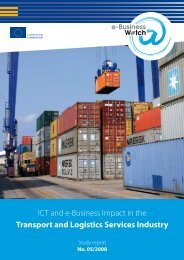The European e-Business Report The European e ... - empirica
The European e-Business Report The European e ... - empirica
The European e-Business Report The European e ... - empirica
Create successful ePaper yourself
Turn your PDF publications into a flip-book with our unique Google optimized e-Paper software.
<strong>The</strong> <strong>European</strong> E-<strong>Business</strong> <strong>Report</strong> 2005<br />
online product, i.e. their internet portal. <strong>The</strong> first and most obvious task is to maximise the number of<br />
visitors to the destination’s website.<br />
In recent years, however, the exponential growth in travel and tourism information available on the<br />
internet may also be challenging for many users. Individual tourism companies have set up their own<br />
websites, but comparing prices and facilities across a number of different service providers can be<br />
very difficult for the prospective tourist. To counter this, DMOs have set up their own portals, on which<br />
(registered) tourism service providers in the region are featured, much as they are in the equivalent<br />
printed brochures.<br />
Another issue is dis-intermediation, where traditional intermediaries such as travel agencies and tour<br />
operators are skipped in the tourism value chain as tourists may deal with service providers directly.<br />
DMOs may strengthen the trend towards dis-intermediation by means of their Destination<br />
Management Systems (DMSs). <strong>The</strong>se systems are expected to be instrumental in achieving a certain<br />
degree of independence from travel agencies and tour operators, by encouraging consumers to book<br />
directly with local service providers.<br />
Customer Relationship Management (CRM) in tourism destinations<br />
CRM involves building up in-depth customer information. Normally, this information includes<br />
customers’ socio-demographic profiles, interests and activities, as well as their past and possible<br />
future requirements. With this type of information most efficiently stored in an electronic database,<br />
tourism service providers could ideally be:<br />
• knowledgeable and efficient in servicing enquiries,<br />
• proactive in targeting best prospect customers with products specifically appropriate to their<br />
needs, and<br />
• establishing the basis for a lifetime relationship with the customer, and maintaining it even<br />
where transactions are not involved.<br />
e-<strong>Business</strong> W@tch surveyed the diffusion of CRM systems and how satisfied companies are with their<br />
effects. <strong>The</strong> outcome is striking: only 7% of tourism companies reported using a CRM system, which is<br />
significantly below the EU-7 average of 15% for all 10 sectors surveyed. <strong>The</strong> difference to sectors<br />
leading in CRM usage is substantial.<br />
Obviously, there is a correlation between the application of CRM systems and company size in tourism<br />
as in general. Medium and large companies are about twice as likely to apply CRM as micro and small<br />
companies. Given the weight of micro and small enterprises in tourism, this partly explains the low<br />
take-up of CRM in the sector.<br />
Yet, in spite of this modest diffusion of ICT-supported CRM solutions in tourism, many researchers<br />
underline the importance of CRM on the sector. Indeed the issue is heavily discussed by experts in<br />
the field and it is on the agenda of numerous conferences, workshops and other events targeted at<br />
decision-makers in tourism.<br />
This discrepancy between the modest adoption of CRM by tourism companies and the perceived<br />
significance of this issue is also <strong>empirica</strong>lly evident. Overall, tourism companies using a CRM system<br />
consider CRM much more helpful than companies from other sectors surveyed. Differences in CRM<br />
assessment are significant: in tourism, 51% of companies perceive CRM as 'very helpful for the<br />
effectiveness of marketing' compared to 41% on average in the 10 sectors studied in 2005.<br />
In fact, tourism has witnessed the introduction of many relationship management and relationship<br />
marketing practices. Airline frequent flyer programmes and hotel frequent guest programmes are at<br />
the forefront of CRM applications in tourism, trying to 'lock' customers systematically to the supplier<br />
because of bonus systems or beneficial pricing systems. Such CRM systems work very well with large<br />
players in the industry. Yet most examples of best practice for a CRM system concern large<br />
enterprises such as the airline industry, intermediaries or hotel chains.<br />
149


